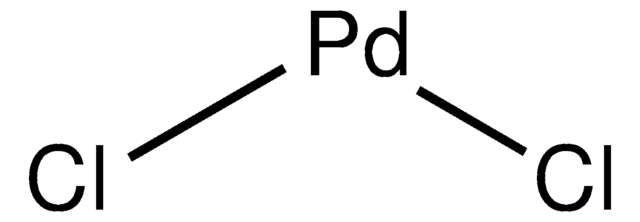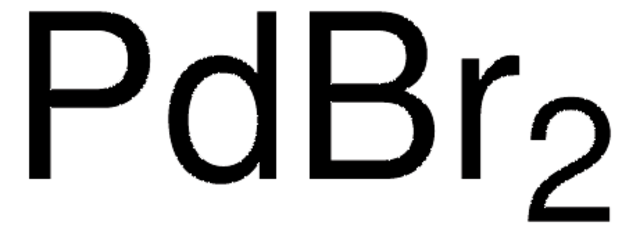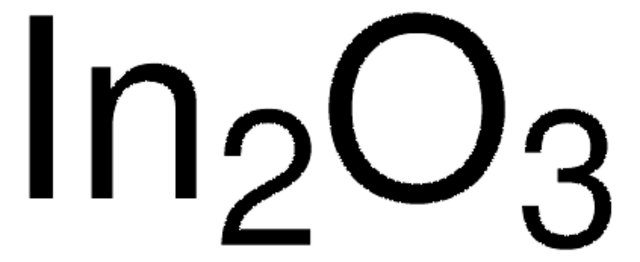76070
Palladium(II)nitrat Dihydrat
~40% Pd basis
Synonym(e):
Palladium dinitrate hydrate
About This Item
Empfohlene Produkte
Qualitätsniveau
Form
powder or crystals
Eignung der Reaktion
reagent type: catalyst
core: palladium
Konzentration
~40% Pd
SMILES String
O.O.[Pd++].[O-][N+]([O-])=O.[O-][N+]([O-])=O
InChI
1S/2NO3.2H2O.Pd/c2*2-1(3)4;;;/h;;2*1H2;/q2*-1;;;+2
InChIKey
JUBNUQXDQDMSKL-UHFFFAOYSA-N
Suchen Sie nach ähnlichen Produkten? Aufrufen Leitfaden zum Produktvergleich
Allgemeine Beschreibung
It is also employed in the fabrication of low-cost solid-state hydrogen storage devices made of three-dimensional (3D) reduced graphene oxide (rGO) and expanded graphite (EG)nanocomposite (NC) decorated with Pd nanoparticles (NPs).
Anwendung
- Doping activated carbon for catalysis
- Catalytic use of hydroxyapatite (HAP) supported Pd nanoclusters in the hydrolysis of ammonia-borane.
It′s used as catalyst for:
- Selective hydrogenation of 1-heptyne and napthalene
- In highly porous coordination polymer MIL-101 support.
It may also be used as a reactant for:
- Preparation of platinum-palladium/carbon alloy nanocatalysts for methanol-tolerant oxygen reduction reaction in fuel cells
- Synthesis of Cu-Pd alloy thin films on Ti substrates by co-electrodeposition of Pd and Cu from nitrate-base electrolytic baths
- Preparation of palladium catalyst supported on vertically aligned multi-walled carbon nanotubes for microwave-assisted Heck reactions of p-iodonitrobenzene with styrene and Et acrylate
- Preparation of di-phenyl sulfide-modified Pd/TiO2 catalysts for acetylene hydrogenation
Signalwort
Danger
H-Sätze
Gefahreneinstufungen
Acute Tox. 4 Oral - Aquatic Acute 1 - Aquatic Chronic 1 - Eye Dam. 1 - Met. Corr. 1 - Ox. Sol. 1 - Skin Corr. 1B
Lagerklassenschlüssel
5.1A - Strongly oxidizing hazardous materials
WGK
WGK 3
Flammpunkt (°F)
Not applicable
Flammpunkt (°C)
Not applicable
Persönliche Schutzausrüstung
Eyeshields, Faceshields, Gloves, type P3 (EN 143) respirator cartridges
Hier finden Sie alle aktuellen Versionen:
Besitzen Sie dieses Produkt bereits?
In der Dokumentenbibliothek finden Sie die Dokumentation zu den Produkten, die Sie kürzlich erworben haben.
Kunden haben sich ebenfalls angesehen
Unser Team von Wissenschaftlern verfügt über Erfahrung in allen Forschungsbereichen einschließlich Life Science, Materialwissenschaften, chemischer Synthese, Chromatographie, Analytik und vielen mehr..
Setzen Sie sich mit dem technischen Dienst in Verbindung.















![[Pd(acac)2] Umicore, 99%](/deepweb/assets/sigmaaldrich/product/structures/145/685/c3d0f078-c0c6-4ce6-9c4a-b6a1b973b3a9/640/c3d0f078-c0c6-4ce6-9c4a-b6a1b973b3a9.png)